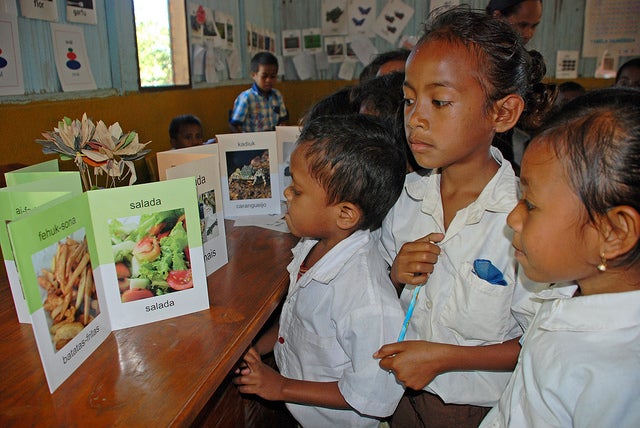
The education group within the World Bank recently held a debate on whether school grants really do buy learning. Interestingly, we ran into some bigger questions before we even got started.
Both of our debaters, education experts David Evans and Harry Patrinos, wanted to know: “What do you mean by ‘school grant’?” “Are you sure this is the question you want to ask?”
As the organizers, we deliberately chose a provocative and pointed question in order to generate a lively, open conversation. To set the stage, we outlined four theories of change:
- Money is what matters. The belief here is that money is the binding constraint. Schools are chronically underfinanced; all they need is more discretionary funds and they will increase learning. This assumes that they know how.
- Money + training, for school directors, is what matters. This posits that money serves as a hook for getting school management teams onboard with some basic management training. If school management is improved, then we can boost learning, à la Bloom et al.
- Money + training, for parents and local communities, is what matters. The third theory identifies local accountability as the main issue, assuming that by providing money and training for parents, they will become more empowered to demand better services from the school, and perhaps increase expectations for their children’s learning.
- Money + attention to learning is what matters. This idea suggests that school grants can serve as a way to align stakeholders around the desired results; in this case, learning. There may even be a “labelling” effect by stipulating clearly to schools what the money is for, e.g. “improving reading”.
In the end, what did we learn? Do school grants buy learning?
Mostly no. Big caution sign here: while there is little evidence that school grants can improve learning outcomes, it might be because grant schemes are usually not designed with learning as the end goal. For a broader set of examples, see Making Schools Work.
What are grants good for then? In the majority of cases, grants seem most effective in boosting enrolment (especially for girls), ensuring access for all, reducing teacher and student absenteeism, and reducing grade repetition and drop-outs (for a more complete summary of the evidence, see Dave’s recent blog on the topic).
Grants as a gateway. One of the questions asked during the discussion was whether or not it even made sense to use school grants if they didn’t buy learning. Even if they don’t always immediately buy learning; however, the leveraging power of the school grant should not be underestimated. If we believe that local accountability, or school management, or even just greater attention to learning is how better outcomes will be generated, then perhaps money does become necessary for any of our theories of change to play out.
For example, school grants may be the entry point to additional, bigger reforms by catalyzing local participation, building capacity, creating incentives for performance and increasing accountability.
In the Mexican school-based management program Apoyo a la Gestión Escolar (AGE), small monetary grants were provided to parent associations to invest in school items they deemed important. Parents also received training in resource management and other participatory skills in order to hold schools more accountable. As a result, the program showed that parental participation did make a difference, and thus paved the way for other school-based management models in Mexico like Programas Escuelas de Calidad (PEC).
Let’s face it – school grants are a big part of what we do in our education projects, so it’s crucial to wield them in ways that can eventually produce the results we seek. Design is key; some think there is no better way to ruin a perfectly good standardized test than by attaching stakes such as school grants to it. It is also important to remember that school grants, like any other education intervention, are not a silver bullet – but their ability to pave a pathway to change is undebatable.
If you have experience with designing, implementing or evaluating school grants – we’d love to hear from you. Leave us a comment and let us know what you would do the next time you’re working on one.
Find out more about World Bank Group education on Twitter and Flipboard .




Join the Conversation